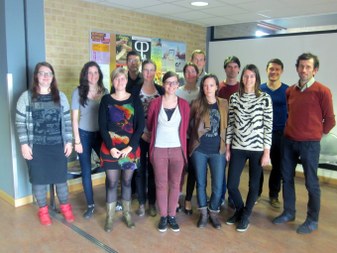Developmental Psychology
Vision
We aim to optimally support the motivation, engagement, resilience, and psychological well-being of children, adolescents, and young adults in various life domains (home, school, leisure). For this, we invest in the psychological needs for growth, namely autonomy, relatedness, and competence. In doing so, we strive for structural changes with a sustainable and growth-promoting impact, which benefit both the basic psychological needs of children and their socialisation figures. We stand for excellent research and the strengthening of the field of practice, starting from a strong belief in people’s natural tendency towards optimal psychological growth.
Mission
We conduct evidence-based research on the factors that support or thwart persons' basic psychological needs and growth, both personal and contextual.
Our target groups are primarily on children, adolescents and young adults, as well as the key figures responsible for their growth (e.g. parents, teachers, social workers). Addittionally, we are also interested in the most important developmental psychological tasks throughout the life course. In this way, the domains of parenting, education, healthy lifestyles, and clinical counseling are the primary focus of our research group.
Self-Determination Theory is our main theoretical framework, but synergies are sought with other theoretical frameworks that study growth-oriented themes. In this way, we try to work both theoretically deepening and broadening.
We go for an interdisciplinary approach, bringing together the expertise of academic partners associated with various faculties and research groups. Specifically, we invest in longitudinal research to study development and growth.
Our research group wishes to profile itself both internally and externally, particularly within the scientific field as well as within the educational and training offerings, and on a social level.
Research projects
The Well-Being Monitor
The Well-Being Monitor annually measures the mental health, resilience and study motivation of students in Flemish higher education through questionnaire research. Students are monitored throughout their academic career. In this way, suitable interventions such as MoodSpace can be developed in a scientific manner.
The Motivation Barometer
From the beginning of the COVID-19 crisis, it was clear to us, motivation psychologists, that this would not only be a sanitary, but also a psychological-motivational crisis. After all, our most important weapon in combatting virus circulation is our behaviour. Sustainably motivating the population in these stressful circumstances cannot be taken for granted. For us academics, this crisis was therefore a unique opportunity to test, refine and optimise existing theories. For this we developed a study called the Motivation Barometer, to follow up a large sample of Belgian citizens during this crisis. In a 6-part podcast, explained in Dutch, French and English, the team of the Motivation Barometer discusses various psychological themes that were relevant during the COVID-19 crisis.
Emerging Adulthood: The Time of Your Life
We're happy, free, confused and lonely at the same time. It's miserable and magical (Taylor Swift, “22”). Emerging adulthood is a critical juncture in human life with unique challenges that are mastered successfully by most people but not by all. First, this project will describe how individual differences in personality and parenting are related to heterogeneity in (mal)adjustment during emerging adulthood. I expect that the interplay of (changes in) personality and parenting is meaningfully related to a variety of important developmental outcomes. Second, I also aim to explain heterogeneity in (mal)adaptation in emerging adulthood by examining crucial mediating and modifiable psychological processes explaining these relations. I expect that emotion regulation and identity commitment are key mediators. The integration of a lifespan (macro-time level) perspective and a dynamic systems (moment-by-moment micro-time level) perspective measuring within-person variability will greatly extend our understanding of why young adults progress along different trajectories. Finally, I aim to predict successful transition to emerging adulthood by developing, implementing and evaluating an RCT intervention focusing on emotion regulation or identity using Virtual Reality, aimed to facilitate a successful transition to emerging adulthood. Ultimately, results from this project can provide young people tools that help them to experience emerging adulthood as the time of their life.
Publications
Check all the publications of our research group.
Check our publications on autonomy in adolescents and emerging adults.
Check our publications on motivation throughout the life course.
Check our publications on identity development in adolescence and emerging adulthood.
Check our publications on parenting of children and adolescents.
Collaborators
Check here all researchers of our team and their research profile:
- Prof. Dr. Wim Beyers
- Prof. Dr. Bart Soenens
- Prof. Dr. Maarten Vansteenkiste
- Prof. Dr. Peter Prinzie
- Prof. Dr. Elien Mabbe
- Dr. Beatrijs Vandenkerckhove
- Dr. Bram Van Bockstaele
- Dr. Branko Vermote
- Dr. Charlotte Schrooyen
- Dr. Daphne van den Bogaard
- Dr. Joachim Waterschoot
- Dr. Khawla Ajana
- Dr. Nathalie Aelterman
- Dr. Nele Flamant
- Dr. Nele Laporte
- Dr. Sabine Sypré
- Dr. Sofie Morbée
- Bente Verhelst
- Berdien Vrijders
- Bram Steeman
- Elke Pinoy
- Fé De Mulder
- Gaël Vanhalst
- Gaël Vanhalst
- Jinte Venninx
- Lowie Bradt
- Marlies Van De Casteele
- Melodia Koupa
- Nathalie Coorevits
- Simon Fiore
